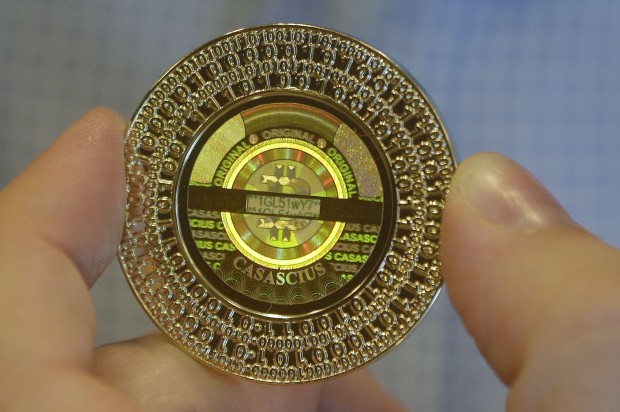(IMAGE 25 Bitcoin Token)
While there has been a congressional hearing, reaching an all-time high of $800, and more and more cryptocurrencies popping up–Bitcoins are still a bit of a mystery to the general public.
Allegedly motivated by the 2008 financial crisis, someone who called himself Satoshi Nakamoto, combined digital signatures, peer-to-peer network technologies, and the collective power of the Internet to create an online financial system that is used to facilitate payments between parties. The system called Bitcoin launched in 2009 with 50 bitcoins, which he dubbed the genesis block. Since its inception, the interest in bitcoins has grown steadily and now some retailers are using them.

Bitcoin’s chief proselytizer, Bruce Wagner, at one of the few New York City restaurants that accept the currency.
Photo: Michael Schmelling
While creating new currency might sound like the golden goose to repay those nagging student loans, it is not as easy it sounds. Unlike other financial systems, Bitcoin is decentralized, meaning there is no one entity set of standards, or restrictions that the network has to abide by. In a traditional financial system there is a central bank that controls the flow and value of money by creating (printing) money. Bitcoin doesn’t have a central entity, but utilizes hundreds of computers across various networks to process transactions called “mining.”
These “miners” basically process transactions and every so often, approximately 10 minutes, a miner has a Eureka moment and gets a prize. The prize isn’t gold, but comes in the form of 25 bitcoins, which roughly translates to about $12,500 currently. This form of digital prospecting has new age gold miners joining the Bitcoin network to process transactions in hopes of hitting. This helps keep money flowing and the network growing.
For those of us not ready to blaze the techno Yukon trail, bitcoins are still available to us through more traditional means as a growing number of places are allowing you to exchange conventional currency for bitcoins. Even bitcoin ATMs have started popping up in a few places. These bitcoins can be used for a number of transactions online for goods and services, plus more traditional vendors are starting to jump on the bandwagon and accept bitcoins.
While Bitcoin sounds like at the very least an interesting venture, it isn’t completely practical as of yet. It isn’t used widely enough to make it worth carrying around. It’s more volatile that trading penny stocks so 50 bitcoins might be worth $10,000 today and $5000 tomorrow and that volatility makes it hard to make purchases. And being decentralized means no real overseers, which sounds fine when you look at your check and see how much FICA and IRS portionalize. But when hackers and shady businesses make bitcoin markets the financial equivalent of the Wild Wild West, you will be looking for some federal regulation. So while it has the potential to change things, it might be a ways off… but is it completely out of the realm of possibility? Anyone who has had to teach their parents how to buy something using Paypal knows that stranger things have happened.
CJ Washington (@BKCJ)

